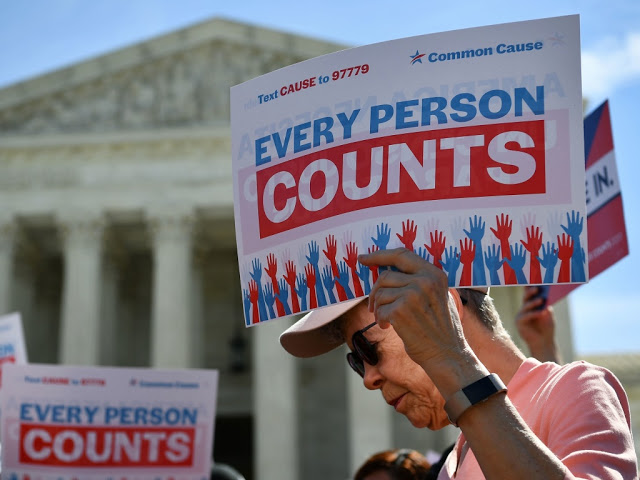Views from the Edge, by Ed Dionko
Today, April 1, is Census Day, officially launching the effort to count every person in the United States.
The tally mandated by the US Constitution has always been a difficult task but it is even trickier in today’s environment of fear and uncertainty partially created by the coronavirus sweeping across the US and partially created by Donald Trump’s racist rhetoric and policies that give bigots permission to openly express their racist beliefs.
Many US residents — especially in immigrant-dominated ethnic groups such as the Asian American and Pacific Islander communities — suspect that their answers to the census count will be used against them, according to an Urban Institute survey released in February.
The survey of 7,694 people conducted in December found that around one-third of adults are concerned that their answers to census questions will be shared with other agencies or used against them in some way.
“We’re conducting this census in a very challenging climate where there’s a great deal of mistrust in how answers are going to be used,” said Michael Karpman, a research associate at the Washington, D.C.-based institute.
Historically, Asian American, Native Hawaiian, and Pacific Islander communities have been undercounted, resulting in missed federal funding for the states and counties in which they reside impacting their communities with the loss of programs that benefit schools, hospitals, local transportation, public works and more.
“We want to remind everyone that participating in the Census is required by the government. We understand the concern on everyone’s mind to remain healthy and for that reason, it’s best to respond online, over the phone or by mail as soon as invitations are received,” said June Lim, demographic research project director for Advancing Justice-LA.
“Simply follow the instructions in your preferred language to answer the nine questions. Amongst other languages, you are able to complete the Census online or by phone in Chinese, Japanese, Korean, Tagalog, and Vietnamese,” Lim advised. “The Census Bureau has printed visual language guides available in 59 language options and video guides to completing the Census online in 63 languages.”
The Urban Instittute survey found that more than two-thirds of respondents erroneously thought there will be a question about citizenship, despite a June Supreme Court ruling striking down that question. The census doesn’t ask the immigration status of the respondents. Almost half of people in families including immigrants think their answers will be used to find people living in the country illegally, despite federal laws preventing such use.
The report also learned that despite the suspicion of the census, 69% of immigrants would take part in the decennial headcount. That still leaves 31% would not likely respond to the questions asked by the Census and remain uncounted.
The Urban Institute survey correspond with an earlier survey done by the US Census Bureau that found among ethnic groups, Asian Americans and Pacific Islanders were the most concerned about the possible misuse of the data collected by the census.
Community outreach efforts began in 2019 and will continue leading up to today, Census Day through August 14, 2020, when the count will be complete. The census was originally scheduled to be completed in July, but due to the coronavirus pandemic has been extended to end in August.
“We do want people to know that all responses that are given, no matter who you are, are protected by law. We cannot share information with any agency, not with immigration, not with law enforcement,” said Filipina American Ivy Daulo, the partnership specialist of the Census Bureau. “We cannot share this information with landlords. This does not affect any benefits that a family may be receiving. We want to emphasize that again, all information that is given to the Census Bureau is protected by law.”
An in-language public service announcement available in approximately 20 Asian and Pacific Islander languages (including English) is set to debut in April along with digital flyers, posters, and user-generated content amplified through social media networks of local small businesses, faith-based organizations, community centers, and more.
“When you visit 2020census.gov you can type in the language like Tagalog or Ilocano on the top right. And you can find all the different types of language support that we offer. But we do have Tagalog support on the form, and also our internet option, as well as our phone option. They have live representatives that can also speak Tagalog.”
The Census Bureau also added material for Ilocano speakers, another dialect of the Philippines, which has eight major dialects but 170 in total.
For more information on the importance of Census 2020 outreach to the Asian American, Native Hawaiian, and Pacific Islander communities and other key facts and statistics, visit Count Us in 2020 – a Census resource hub hosted by the Asian American Advancing Justice affiliation, a collaboration of five leading organizations advocating for the civil and human rights of Asian Americans and other underserved communities to promote a fair and equitable society for all, together with Empowering Pacific Islander Communities, and their collective partners.
AsAmNews has Asian America in its heart. We’re an all-volunteer effort of dedicated staff and interns. Check out our new Instagram account. Go to our Twitter feed and Facebook page for more content. Please consider interning, joining our staff or submitting a story.



